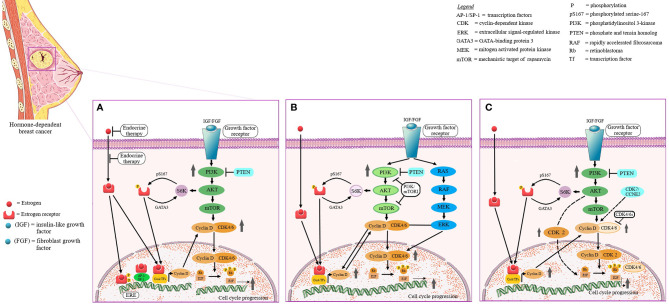Figure 5.
The identified signaling pathways involved in the mediation of sensitivity/resistance versus endocrine therapy. The signaling pathways that involve cyclin D—cyclin-dependent kinase 4 and 6 (CDK4/6)/6-INK4- retinoblastoma (Rb) and phosphatidylinositol-3 kinase/mechanistic target of rapamycin (PI3K/mTOR) play a central role in cell cycle progression, cellular differentiation, growth, survival and metabolism. Dysregulation of these pathways results in genetic/epigenetic alterations, increased proliferation and evasion of apoptosis, as observed in hormone receptor-positive breast cancer (HR)+, and have been involved in the development of endocrine therapy resistance. PI3K/mTOR pathway activates S6 kinase and leads to estrogen receptor (ER) signaling activation. Activation of ER pathway upregulates the protein expression of cyclin D, activates cyclin D—CDK4/6/6-INK4- Rb pathway and increases cell cycle progression (A). The resistance to PI3K/mTOR pathway inhibitors occurs via an aberrant activation of RAS/RAF/MEK/ERK pathway that produces an additional assembly of cyclin D-CDK4/6 complexes (B). In HR+ breast cancer the cyclin D - CDK4/6/6-INK4- Rb pathway, in particular cyclin D and CDK4, is overexpressed. Activation of PI3K/mTOR pathway leads to cyclin D upregulation, binding and activation of CDK2 (if CDK4/6 is absent) and consecutive Rb phosphorylation and cell cycle progression. CDK4/6 inhibitors have synergistic effects to endocrine therapy (C).

